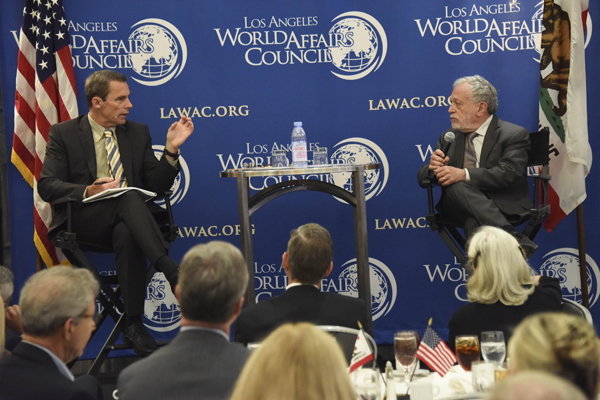
Robert Reich (right) addressing LAWAC members at a lunch at the InterContinental Hotel
Robert Reich compared the US today to the end of the Gilded Age in the late 1800s when he said the income inequality, corruption and monopolization was very similar. “And yet,” he said, “we snapped back in 1901 under the most unlikely President.” The former Labor Secretary under President Clinton is no fan of the current president, but he said that “Donald Trump is not the cause of the problems we are enduring, but the culmination of three decades of letting our problems fester.”
And he said he was optimistic, nonetheless. “As a historian you see there are patterns that develop: we have been here before, we will bounce back.” Reich said he had not seen a generation of students “more committed to changing the country” than today, citing students he interacts with in his teaching at Berkeley and the high school students in Parkland FL. “It is only when you are losing something that is valuable that you recognize how valuable it is – we are now realizing the value of our democracy.”
Reich has just written a book, The Common Good, which argues that Americans began losing their commitment to the common good in the late 1970’s in favor of “looking out for number one.” This culminates in the cynical greed on show today in the behavior of characters like Martin Shkreli, the investor who hiked the price of a life-saving drug by 5,000%. He blames politicians for much of the problem – in the 1970’s only 3% of retiring Congress members became lobbyists, while in 2016 roughly 50% of retiring Senators became lobbyists. “It is all about money! I have seen Washington become richer and richer and richer. Stand on a corner of K Street and one out of every four people who pass you are lawyers.”
In his travels across the country in the past three years as he made two documentaries, he said he found that “people are deeply angry – they say the system is rigged against them.” Statistically the average American worker hasn’t had a raise in 30 years. “So I would find people saying in the same breath they would vote for Trump or Sanders. I would say that is impossible, they are so different, and the answer was they just wanted someone to shake things up.” Reich said that kind of anger is dangerous to democracy, because it “opens up the way to demagoguery.”
When asked about how Americans have developed such a short attention span in their political judgments, Reich said that much of the blame lies with the media and those who “feed the media”, like Trump. “I don’t think we have had a president who understood how to manipulate the media as well as Donald Trump does.” Reich said too many people live in their own self-affirming bubbles, reinforced by social media that just shows them opinions they already agree with. “I tell my students the best way to sharpen their minds is to talk to people they disagree with. Go visit a relative who lives in a red state!”
Asked about health care, Reich said that in his view it was only a matter of time before the US adopts a single payer system. The US spends 18% of GDP on health care, he said, much more than other developed countries (the EU average is 10%) and yet it is very inefficient. “The Affordable Care Act is unravelling, people in DC know this, even Republicans know this – we need a single payer system.”
On the North Korean problem, Reich said that the motivations of both Kim Jong Un and President Trump were similar: Kim wants to be seen as the equal of a great power, and Trump wants to be respected as a great leader. “One might consider this as two sociopathic narcissists getting together to decide the fate of the world.” But, he reminded the audience, he was optimistic about the future.

 Robert Reich on valuing US democracy.
Robert Reich on valuing US democracy.